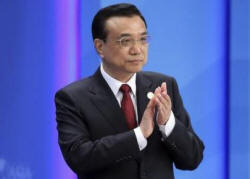|
 China
to boost bank lending power, though IMF says no need China
to boost bank lending power, though IMF says no need
 Send a link to a friend
Send a link to a friend
[June 06, 2014]
By Koh Gui Qing
BEIJING (Reuters) - China
aims to cut the proportion of cash that commercial banks
must keep with the People's Bank of China, the country's
banking regulator said on Friday, signaling further
monetary loosening although the IMF and World Bank say
its economy is doing fine.
|
|
 The China Banking Regulator Commission (CBRC) did not say when
reductions in banks' reserve requirement ratios (RRR) would be made,
but it is the third time in as many months that Beijing has signaled
a cut in RRRs, which would free up more cash for lending needed to
shore up growth. The China Banking Regulator Commission (CBRC) did not say when
reductions in banks' reserve requirement ratios (RRR) would be made,
but it is the third time in as many months that Beijing has signaled
a cut in RRRs, which would free up more cash for lending needed to
shore up growth.
The CBRC did, however, qualify its comments, saying RRR reductions
would be available to those banks whose lending to small firms and
the farm sector warranted the reward. It did not elaborate further.
The central bank also signaled on Friday that it would keep credit
supply ample by letting China's main money market rate fall again
this week.
The International Monetary Fund, in a report released a day earlier,
said no extra policy loosening was warranted at this stage, and
Beijing should focus on re-orienting its economy.
Aside from prospects for reductions in banks' RRR, two bankers told
Reuters on Friday that the central bank has also lent $16 billion to
commercial banks so that they can issue the money to farming
projects.

Both the IMF and World Bank gave China "thumbs up" in separate
reports this week that said the world's second biggest economy
should hit the government's target of around 7.5 percent growth this
year, and encouraged the more urgent pursuit of reforms.
Some economists say the IMF and the World Bank may have been unduly
confident about China's near-term growth prospects.
"If the government wants to achieve its 7.5 percent growth target, I
don't really agree with the IMF that it can just not do anything,"
said Julian Evans-Pritchard at Capital Economics in Singapore. "I
think the downward pressure on the economy, especially from the
property sector, is still quite significant."
Buffeted by unsteady global demand and slowing domestic investment,
growth in China's stuttering economy cooled to an 18-month low of
7.4 percent between January and March. A cooldown in a buoyant
property market, which contributes more than 15 percent of China's
economic expansion, has fueled fears that one of the world's biggest
growth engines will face even stronger headwinds in coming months.
That has fed investor speculation that China would take firmer
action to boost activity, including lowering the RRR across the
board for all banks.
VIGILANT ABOUT SHADOW BANKS
Banks's RRRs are neither uniform or transparent in China, and
members of the ruling Communist Party's politburo have the final say
on monetary policy, rather than the central bank or banking
regulator.
[to top of second column] |

In April, a week after an announcement by Premier Li Keqiang, the
PBOC reduced the RRR by between 50-200 basis points for some banks.
It did not name the banks or detail what their RRRs were after the
cut, but the central bank said only some rural banks benefitted,
with cuts varying between 50 basis points to 2 percentage points.
Smaller banks tend to have lower RRRs than major banks.
The authorities flagged another cut a week ago, but it is unclear
whether that has taken place, though the latest comments from the
banking regulator have hardened expectations.
The last time China reduced the RRR for all banks was in May 2012,
when a cut of 50 basis points lowered the ratio to a maximum 20
percent for the country's biggest banks.
Authorities have chosen a more nuanced approach this year, opting to
selectively relax policy in areas that it believes require
assistance, rather than let money seep into speculative or wasteful
activities.
The CBRC also said on Friday that it will tighten supervision of the
shadow banking sector to crack down on risky lending that occurs
outside banks' balance sheets.
"The financial risks in important sectors still require stronger
regulation," it said.
(Additional reporting by Shen Yan; Editing by Simon Cameron-Moore)
[© 2014 Thomson Reuters. All rights
reserved.] Copyright 2014 Reuters. All rights reserved. This material may not be published,
broadcast, rewritten or redistributed.

 |